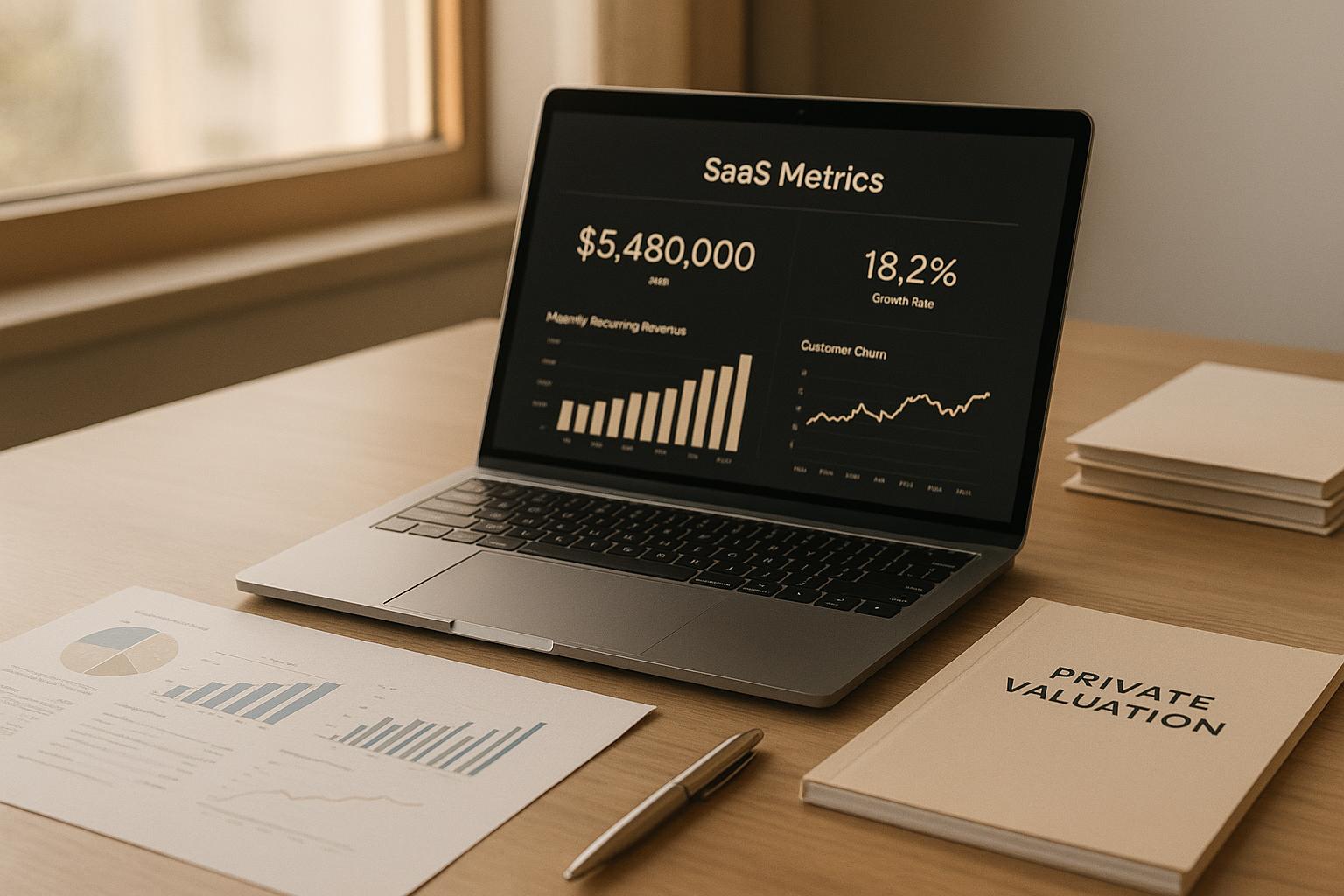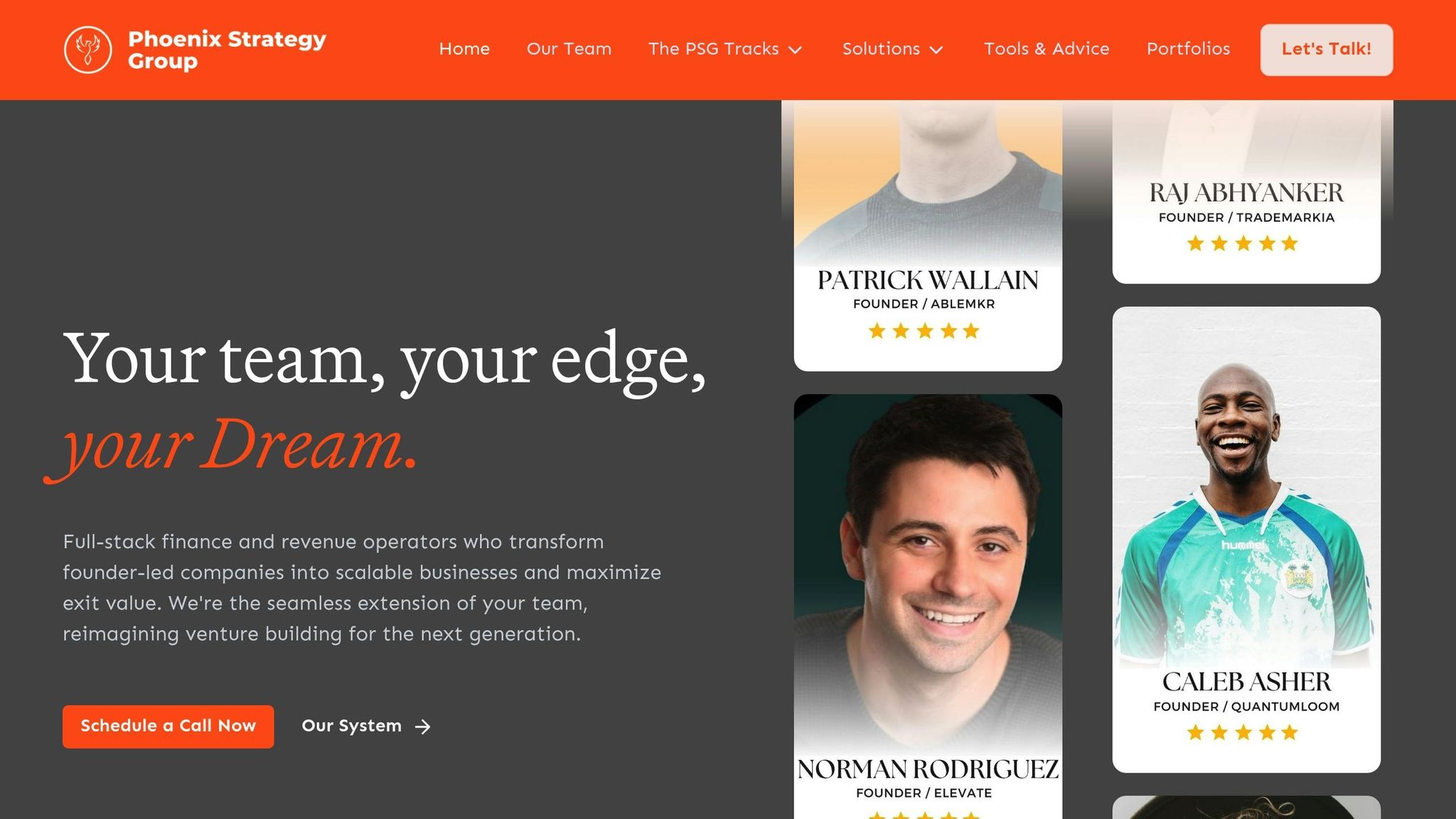Public Multiples for Private SaaS Valuations

Valuing private SaaS companies starts with public SaaS multiples but requires adjustments to account for private firms' unique challenges. Public SaaS companies benefit from liquidity, scale, and financial transparency, while private firms face risks like limited liquidity, smaller scale, and concentrated customer bases. These differences mean public multiples alone often lead to inaccurate valuations for private companies.
Key takeaways:
- Public multiples offer a baseline but often require discounts for liquidity and operational scale.
- Private SaaS risks include higher churn, delayed profitability, and customer concentration.
- Expert input ensures accurate valuations by addressing private company specifics like growth potential, customer acquisition costs, and revenue quality.
Phoenix Strategy Group specializes in private SaaS valuations, offering services like financial modeling, fractional CFO support, and M&A advisory. Their tailored approach blends public benchmarks with private market insights, ensuring valuations align with business realities.
For quick estimates, public multiples work. For high-stakes decisions like fundraising or acquisitions, professional advisory services provide deeper accuracy and actionable insights.
1. Public SaaS Valuation Multiples
Public SaaS valuations reflect both market sentiment and investor confidence. These valuations are often expressed as enterprise value to revenue ratios and serve as benchmarks for valuing private SaaS businesses. However, applying these multiples to private companies isn’t straightforward - it requires adjustments to account for specific company fundamentals and market dynamics, making private SaaS valuations a more intricate process.
Revenue multiples for public SaaS companies depend heavily on growth rates and profitability. High-growth companies typically command higher multiples, while slower-growing or less profitable businesses trade at lower ratios. To get an accurate comparison, it’s crucial to choose public companies with similar business models, target audiences, and growth patterns as the private SaaS company being evaluated.
For instance, if a private SaaS company primarily serves small businesses, it wouldn’t make sense to compare it to public SaaS companies focused on enterprise clients. Differences in factors like customer acquisition costs, contract sizes, and retention rates mean a more tailored approach is necessary for valuation.
Market timing is another key factor. Public SaaS valuations can swing significantly during periods of market volatility, often driven by investor sentiment rather than company fundamentals. When using public multiples to value private companies, these short-term market shifts must be separated from the long-term value of the business. This is where the liquidity premium comes into play.
Public companies offer shareholders immediate liquidity, while private investors often face longer holding periods. This lack of liquidity in private investments usually requires a discount to public multiples to reflect the added risks and constraints.
Operational scale differences also warrant adjustments. Public SaaS companies often benefit from economies of scale, diversified revenue streams, and strong market positions. Private companies, on the other hand, may lack these advantages, which can limit their ability to sustain high growth rates or achieve profitability levels that justify higher valuations.
Another important consideration is financial transparency. Public companies are required to meet strict reporting and auditing standards, ensuring greater reliability in their financial data. Private companies, however, may not adhere to the same level of scrutiny, introducing uncertainties that often lead to more conservative valuation adjustments.
Given these challenges, having valuation experts involved is essential. Their expertise ensures that these adjustments are applied accurately, paving the way for more reliable methodologies. The next section will explore how these adjustments are implemented in practice.
2. Phoenix Strategy Group Services for SaaS Valuations

Phoenix Strategy Group offers financial advisory services specifically designed for private SaaS companies. Their approach focuses on blending market data with the unique traits of each business to deliver accurate valuations. Here’s how their services address the specific challenges of valuing private SaaS firms.
One key offering is their Integrated Financial Model, which brings together essential financial data and market insights to ensure accurate valuations. They also provide Fractional CFO services, leveraging their Weekly Accounting System to deliver consistent financial reporting - perfect for navigating the complexities of SaaS valuation.
The team’s data engineering capabilities help gather and refine operational data, while their Monday Morning Metrics service keeps a close watch on critical performance indicators to ensure businesses stay on track.
For companies involved in mergers and acquisitions, their M&A advisory service provides valuable market insights tailored to private SaaS transactions. Additionally, their revenue engine analysis pinpoints the main revenue drivers, and their cash flow forecasting helps businesses plan for future capital requirements.
Founded by David Metzler, John Zdanowski, and Ethan Lu, Phoenix Strategy Group blends extensive financial expertise with flexible service packages. These packages - Basic, Growth, and Enterprise - are designed to support SaaS companies at every stage, from early fundraising to planning strategic exits.
sbb-itb-e766981
Pros and Cons
When it comes to valuing private SaaS companies, you generally have two main options: leveraging public market multiples or working with specialized advisory services like Phoenix Strategy Group. Each approach has its strengths and drawbacks, and your choice can significantly influence the accuracy of your valuation and the decisions you make based on it.
| Aspect | Public SaaS Multiples | Phoenix Strategy Group Services |
|---|---|---|
| Cost | Free access to public data | Professional fees apply |
| Speed | Quick calculations using available metrics | In-depth analysis that takes more time |
| Accuracy | May overlook private company nuances | Adjusts for private market specifics |
| Customization | One-size-fits-all with limited flexibility | Fully tailored to your business model |
| Market Context | Reflects public market trends | Includes insights from private market transactions |
| Ongoing Support | No follow-up or refinement | Continuous monitoring and valuation updates |
Public multiples offer a straightforward way to estimate value using revenue ratios from established SaaS companies. They’re ideal for quick comparisons or when you need a ballpark figure. However, public companies often trade at a premium compared to private ones, thanks to factors like liquidity and broader access to institutional investors. This means public multiples might not fully account for the unique challenges and limitations of private businesses.
One key adjustment when using public multiples is the liquidity discount, which reflects the reduced marketability of private companies. Without this adjustment, valuations risk being overly optimistic and misaligned with private market realities.
On the other hand, Phoenix Strategy Group provides a more nuanced approach. Their tailored models and ongoing analysis ensure valuations account for factors like growth sustainability, customer concentration, and competitive positioning. By incorporating private market transaction data and offering M&A advisory expertise, they deliver valuations that are more grounded and realistic. This level of detail becomes especially important during critical moments like fundraising or exit planning, where precision can make or break a deal.
For early-stage companies looking for quick guidance, public multiples can be a good starting point. But for businesses gearing up for major fundraising, acquisitions, or strategic decisions, the comprehensive and customized analysis provided by Phoenix Strategy Group offers a deeper, more actionable understanding of value. Ultimately, the choice depends on your specific needs and the level of detail required for your situation.
Conclusion
Valuing private SaaS companies effectively requires a mix of public market data and specialized financial expertise. Public multiples provide a quick snapshot of market trends and serve as a baseline for valuations, but they often need adjustments to account for liquidity issues and the unique characteristics of individual companies. The most precise valuations come from combining these public benchmarks with in-depth, tailored analysis - starting with public multiples to establish a market framework and refining the process with expert advisory input.
Phoenix Strategy Group specializes in addressing the gaps public multiples leave behind. Their fractional CFO services and M&A advisory expertise dive deep into critical factors like customer concentration, churn rates, and growth sustainability. These insights are crucial for fundraising efforts and successful exits. By merging market-based benchmarks with detailed financial analysis, you can build valuations that support smart strategic decisions and profitable transactions.
For a practical approach, use public multiples as a starting point for benchmarking and market positioning. When accuracy becomes critical - such as during high-stakes decisions - engage professional advisory services to refine the valuation and ensure it aligns with your goals.
Valuation isn’t a one-and-done process. As market conditions shift and your business evolves, regular reassessments are essential. Growth metrics, profitability, and market dynamics all change over time. With Phoenix Strategy Group’s expertise, you can continuously adjust your valuation model to reflect these changes, keeping your SaaS company well-positioned to seize market opportunities and meet investor expectations.
FAQs
How should public SaaS multiples be adjusted to value a private SaaS company?
When assessing the value of a private SaaS company, it's important to adjust public SaaS multiples to reflect differences in market conditions. Private companies often experience a market discount, which has increased significantly - rising from about 25% to as high as 50% in recent years.
Several factors play a critical role in determining these adjustments, including the company's growth rate, churn, profitability, and net revenue retention (NRR). For instance, if a company has a lower NRR or slower growth, it may see its valuation multiple reduced even further. These adjustments are essential to account for the distinct risks and characteristics unique to private companies when compared to their public counterparts.
What risks can affect the valuation of private SaaS companies?
Private SaaS companies face several risks that can heavily impact their valuation. One major factor is market size limitations. Companies operating in markets with a total addressable market (TAM) of less than $1 billion often struggle to achieve higher valuation multiples, as their growth potential is naturally capped.
Other significant risks include growth rate fluctuations and customer retention issues. For instance, inconsistent growth or failing to maintain strong net revenue retention - generally around 100% or more - can make future revenue streams less predictable. This kind of uncertainty can lead to valuation differences that stretch into the tens of millions of dollars. Clearly, steady growth and a loyal customer base are critical for maintaining a strong valuation.
In short, private SaaS companies that focus on scalable growth, reduce churn, and sustain high levels of recurring revenue are far better positioned to command higher valuations.
Why should private SaaS companies work with professional advisors like Phoenix Strategy Group for valuation decisions?
For private SaaS companies tackling valuation decisions, bringing in professional advisors like Phoenix Strategy Group can make all the difference. These experts dive deep into critical metrics such as growth rates, customer churn, and profitability, ensuring everything aligns with both market trends and industry standards.
Phoenix Strategy Group’s specialized approach helps minimize risks, sharpen financial performance, and boost investor confidence. Their guidance ensures valuations are precise and strategically designed to enhance enterprise value when it matters most.




